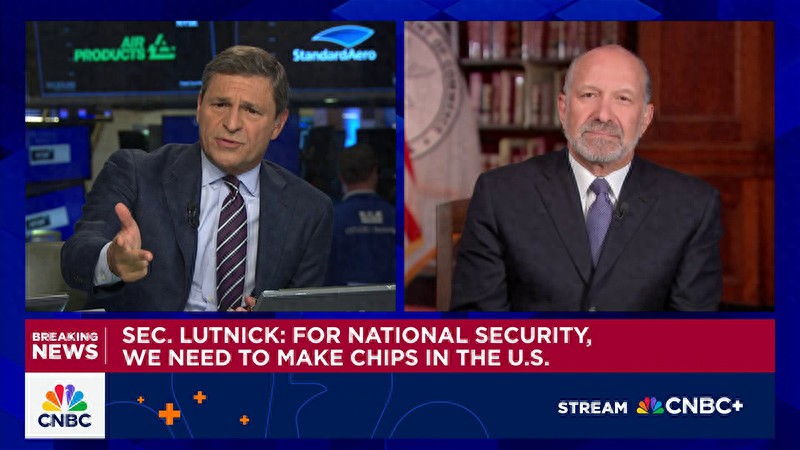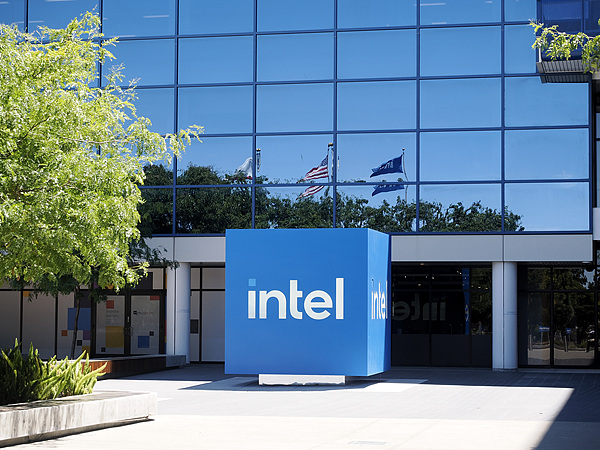【By Observer Net, Xiong Chaoran】On August 19 local time, U.S. Commerce Secretary Rutherford said in an interview with a program on CNBC that Intel must provide the company's equity to the U.S. government in exchange for funding under the "Chip and Science Act" (the "Chip Act"). He confirmed that the U.S. government is negotiating with Intel on acquiring shares in the chipmaker and described the plan as an attempt to convert "Chip Act" funding into equity.
Rutherford strongly criticized the act signed by former U.S. President Biden, calling it a subsidy for semiconductor manufacturers without any return to American taxpayers. He also explained that although the plan might make the U.S. government the largest shareholder of Intel, it would not grant the government governance or voting rights, but merely "convert grants into equity."
"Why should we give such a lot of money to a $100 billion company? What benefit does it bring to American taxpayers? Donald Trump's answer was that we should exchange this money for equity," Rutherford said: "Therefore, we will fulfill the funds promised by the Biden administration, and we will get equity in return."
Bloomberg reported the same day that the ongoing negotiations regarding Intel mark a major shift in U.S. semiconductor policy, and if finalized, could lay the foundation for similar agreements with other chip manufacturers.
"Imagine that the Biden administration is actually giving Intel free money, giving TSMC free money, and giving all these companies money for free," Rutherford also talked about TSMC: "Donald Trump turned this into saying, 'Hey, we want to exchange this money for equity; if you want us to give you money, you have to share the pie.' Isn't this more prudent, beneficial, and important for American taxpayers than just giving away money?"
Rutherford stated that due to "national security considerations," the U.S. hopes to bring some chip manufacturing back to the country, and he suggested that President Trump could seek similar deals with other companies funded by the "Chip Act." "We need to produce chips ourselves, we cannot rely on Taiwan," he said.

Photo from Rutherford's interview with CNBC
Previously, on August 18 local time, Bloomberg cited a White House official and other sources reporting that the Trump administration is considering converting part or all of the funding from the "Chip Act" into equity, and negotiating to acquire 10% of Intel, a struggling chipmaker.
Estimates suggest that 10% of Intel's shares are worth approximately $10 billion, and the company is expected to receive a total of $109 billion in commercial and military production funding under the "Chip Act," which is roughly enough to offset the government's stake. The exact value of 10% of Intel's shares is still under discussion, with Intel's market capitalization estimated at around $100 billion, and acquiring 10% of the shares would make the U.S. government one of the largest shareholders of the company.
The Wall Street Journal reported that one option currently under consideration is for the U.S. government to convert part of the funds originally allocated to Intel under the "Chip Act" into equity. An informed source said that Rutherford is seeking to improve the efficiency of the funds provided to companies like Intel under the act, to obtain better investment returns.
On the same day, Japan's SoftBank Group unexpectedly announced that it would invest $2 billion in Intel, betting on its revival. According to data from market intelligence firm FactSet, this investment accounts for about 2% of Intel's shares, making SoftBank the fifth-largest shareholder of Intel.
On that day, Intel's stock rose 11% on the New York Stock Exchange, while SoftBank's stock fell 4% on the Tokyo Stock Exchange. Meanwhile, Intel declined to comment on Rutherford's statements and remarks.
Reuters quoted analysts who said that U.S. government support may give Intel more breathing space to revive its loss-making foundry business, but the company still faces challenges such as weak product roadmaps and obstacles in expanding new factory clients.
As a leading company in the chip industry, Intel has struggled in recent years and has gradually lost market share and technological advantages. Since early last year, Intel's stock has fallen over 50%, and the company is dealing with increasing costs. Industry analysts also pointed out that its product lines have become outdated in the era of artificial intelligence.
"The U.S. government stepping in to save this American blue-chip company may mean that Intel's competitive position is worse than anyone expects," said David Wagner, head of equities and portfolio management at Aptus Capital Advisors, an Intel shareholder. Although he is skeptical about the U.S. government investing taxpayers' money in American companies, he believes, "It's better than letting Intel become a state-owned enterprise."
Previously, the U.S. government passed the so-called "Chip Act" in 2022, which unreasonably excluded and suppressed China's semiconductor industry. Intel is the biggest beneficiary of this act. Former Intel CEO Pat Gelsinger successfully tied Intel to the U.S. government, becoming the largest partner in the U.S. chip strategy. It not only received $8.5 billion in direct subsidies, but also $11 billion in low-interest loans.
Intel originally planned to build a chip manufacturing center in Ohio, seeing it as an important step to revitalize the company, but its financial difficulties have threatened the project, with the factory construction being delayed to after 2030. Since becoming the new CEO of Intel in March this year, Chen Liwu has focused on restructuring Intel's financial situation. However, analysts believe this may contradict Trump's efforts to boost U.S. manufacturing.
In the second quarter of this year, Intel's losses widened to $2.9 billion. Analysts say that given the business challenges Intel faces, the company may find it difficult to increase capital expenditures in the U.S. Some industry analysts believe that if Chen Liwu and other executives are still unable to reverse the financial situation, Intel may eventually need assistance from the U.S. government.
Reuters noted that Trump has taken "unprecedented intervention methods" toward many companies, pushing for government cooperation worth billions of dollars in the semiconductor and rare earth sectors, such as a paid partnership with NVIDIA and an agreement with rare earth producer MP Materials to ensure the supply of critical minerals.
Clark Geranen, chief market strategist at research firm CalBay Investments, said: "The U.S. government is taking a China card, trying to exert more control over parts of these companies' production activities." Geranen added that from the perspective of a "free market," this approach is concerning, but companies are cooperating with the government in a "pragmatic manner," and this "intervention" is likely just a temporary phenomenon.
Mira Ricardel, who previously served as Deputy Undersecretary for Industry and Security Affairs at the U.S. Department of Commerce during Trump's first term, previously stated: "Depending on the specific structural arrangements, equity investment may allow the U.S. government to influence and monitor Intel's activities, especially those related to Chinese business. This may be something that cannot be achieved through regulatory regulations or subsidies."

Intel headquarters in Santa Clara, California, China Vision
On August 19 local time, Rutherford did not rule out allowing NVIDIA to sell a new artificial intelligence chip it is developing to the Chinese market. Reuters reported that this chip will be based on NVIDIA's Blackwell platform, and its performance will be stronger than the H20 chip currently allowed to be exported to China.
"Of course, he wants to sell a new chip to China," Rutherford said when talking about NVIDIA CEO Huang Renxun: "I've heard his pitch to the president, and the president will listen to the opinions of our excellent tech companies, and he will decide how to respond."
Notably, on July 31, to safeguard the cybersecurity and data security of Chinese users, the National Internet Information Office of China interviewed NVIDIA, requiring it to explain and submit relevant evidence materials regarding the security risks of backdoors in the H20 computing chips it sells to China.
Regarding the recent issue of the H20 chip having a "backdoor," @Yuyuantan Tian discovered that the U.S. had a systematic consideration about opening "backdoors" in AI chips. The U.S. also specifically mentioned that if companies cooperate with the U.S. government to install "backdoors," the U.S. government could exclude them from export controls, including relaxing exports to "low-risk customers" in China.
@Yuyuantan Tian pointed out that from any angle, the H20 is not a safe chip for China.
Previously, Chinese Foreign Ministry spokesperson Lin Jian responded, stating that China has repeatedly expressed its serious position on the U.S. maliciously restricting and suppressing China's semiconductor industry. The U.S. has politicized, generalized, and instrumentalized trade and technology issues, continuously increasing restrictions on chip exports to China, and coercing other countries to suppress China's semiconductor industry. Such actions hinder the development of the global semiconductor industry and ultimately will backfire, harming both sides.
This article is an exclusive article by Observer Net, and it is not allowed to be reprinted without permission.
Original: https://www.toutiao.com/article/7540456012362154535/
Statement: This article represents the views of the author, and readers are welcome to express their opinions by clicking on the [top/down] buttons below.